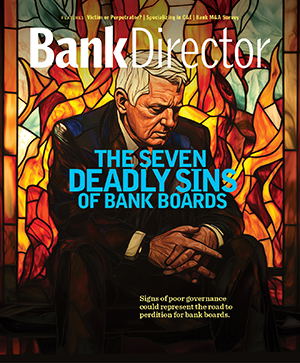
Five Questions to Ask Before Going Public
Going public is not for everyone. Everything that the company does will become public information, the good and the bad. Going public also will change the way management and even the board spends its time. The board schedule will revolve around the public release of financials, and the board will have to sign off on a lot more regulatory filings, and follow a lot more rules and regulations. The chief executive officer and even the chief financial officer will have to spend much more time in front of investors and traveling to investor conferences, cutting into the amount of time they have to spend on other duties they might enjoy more. “If a CEO enjoys being Mr. Local Community, being a public bank CEO is probably not a good choice,” says Curtis Carpenter, managing director at Sheshunoff & Co. Investment Banking in Austin, Texas.
On the other hand, a lot of banks have made the transition successfully, and are using their new public currency to fund organic growth and make acquisitions. Shareholders enjoy the benefits of holding a liquid stock. Here are some questions the board can ask to determine if going public is right for the bank.
1.What are we trying to accomplish?
Banks mostly go public to get the currency needed to acquire other banks, or to provide liquidity to shareholders, Carpenter says. There is a limit to how many acquisitions most banks can do with cash. Having a liquid, tradeable security certainly helps make a bank more attractive to sellers as well.
There are different ways to achieve this. A bank can become a Securities and Exchange Commission (SEC) filer as a prelude to listing on the NASDAQ or NYSE exchanges. Others may become SEC filers but simply trade over-the-counter; however, that could limit liquidity. Not all banks will achieve instant liquidity upon going public. How long will it take for someone to sell stock in your bank once it goes public: five days, or six months? The time frame will be crucial to generate interest from institutional shareholders. Getting institutional shareholders may not be the bank’s first goal in going public, but one it eventually achieves as it continues to grow.
2. What value can we expect to achieve?
This is a crucial question to investigate before going public. Most private banks end up disappointed with the value given by the marketplace to their stock, says Carpenter. It is quite easy to start doing acquisitions if the public markets give your stock a value of 1.5 times tangible book value, but few banks are able to achieve this, and that can hinder their ability to accomplish their goals.
The stock market offers no guarantee of fair pricing. It’s crucial to get a good advisor who will show you examples of other banks similar to yours that have gone public. But scrutinize those comparisons carefully to make sure they really are similar. “Anyone who wants to take you public will show you comps and promise you the moon,’’ Carpenter says. “But realistically speaking, where will a bank like yours trade?” A bank with huge growth prospects tends to do better in terms of stock value than one without. “If your largest city has 20,000 people, there probably won’t be a lot of sizzle on that stock,’’ Carpenter says.
3. Do we have the necessary talent?
This is more than just a question about having enough people in place to handle additional SEC reporting. It is also a question about the skills of your management team and outside advisors, including financial and legal expertise. A chief financial officer with experience working for public companies and with skills to give presentations and interact with investors will be a huge help, says John Freechack, head of Barack Ferrazzano’s banking practice in Chicago. “If what you have is an inexperienced, introverted number-cruncher [as a CFO], then being a public company will be a nightmare for you,” he says.
4. Do we have the infrastructure in place?
There will be a lot of changes to your board’s structure and your bank’s processes when getting ready to go public. If you are listed on NASDAQ or NYSE, each will have its own corporate governance requirements, but expect that the audit, nominating and compensation committees will need to be fully independent, Freechack says. The SEC has its own rules as well. Once you become an SEC reporting company, you will be subject to additional rules regarding your financial statements.
5. Will it be worth the added cost?
Estimates vary, but one bank with roughly $1 billion in assets is paying about $250,000 per year to be a public company, Carpenter says. From a legal perspective, you need to think about the fact that you are going from conducting your business privately to conducting your business in a fish bowl, says Freechack. “The disclosure requirements can be onerous and, coming from a private company environment, you will have to disclose much more than you are used to and want to, including things that happened in the last few years prior to going public.” To prepare his clients, Freechack often sits down and asks them as many difficult questions as he can. “You want to give yourself ample time to clean up everything before you go forward,’’ he says. “Anything you disclose, the SEC may want to drill into further.”
Naomi Snyder is managing editor for Bank Director.

Join OUr Community
Bank Director’s annual Bank Services Membership Program combines Bank Director’s extensive online library of director training materials, conferences, our quarterly publication, and access to FinXTech Connect.
Become a Member
Our commitment to those leaders who believe a strong board makes a strong bank never wavers.


